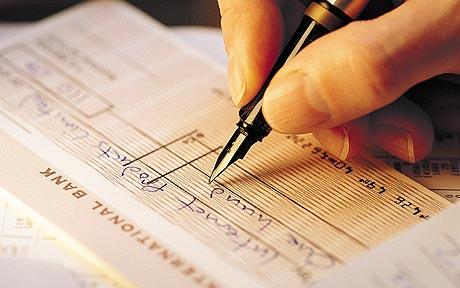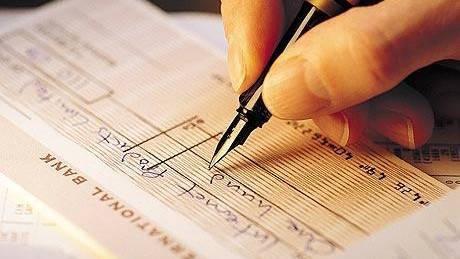Britain bounces checks after 300 years
Source: reuters.com

After more than three centuries, the humble check is set to become a historic relic after British banks voted to phase it out in favor of more modern payment methods.
The board of the UK Payments Council, the body for setting payment strategy in Britain, agreed on Wednesday to set a target date of October 31, 2018 for winding up the check clearing system. The board is largely made up of Britain's leading banks.
"There are many more efficient ways of making payments than by paper in the 21st century, and the time is ripe for the economy as a whole to reap the benefits of its replacement," Paul Smee, the council chief executive, said in a statement.
The use of checks has fallen drastically in the past 10 years as more consumers transfer money electronically, by direct debit or with debit and credit cards. Last year, around 3.8 million checks were written every day in Britain, compared to a peak of 10.9 million in 1990, the council said.
It costs about one pound to process every check.
"The next generation probably won't even have a checkbook," said Addy Frederick, a spokeswoman at the payments council.
But while many UK supermarkets, high street retailers and petrol stations have stopped accepting checks, they are still a popular form of payment among elderly people, many of whom find the idea of using automated cash machines intimidating.
"Chip and pin is problematic for many older and housebound people and we know 6.4 million over 65s have never used the internet," said Vicky Smith, a spokeswoman for the charity Age Concern.
"Without checks, we are very concerned people will be forced to keep large amounts of cash in their home, leaving them vulnerable to theft and financial abuse."
Harriet Harman, deputy leader of the ruling Labour Party, said on Wednesday the authorities must take care not to discriminate against the elderly in making their decision.
"We need to look to the future but make sure that older people don't suffer as a result," she told parliament.
The council said checks would be phased out gradually, making sure consumers had access to user-friendly alternatives and that the needs of elderly and vulnerable groups were met. A review will take place in 2016 before checks are finally abolished.
The Federation of Small Businesses said it was disappointed by the decision. "It's something that's going to impact heavily on small businesses and their customers," said spokeswoman Sophie Kummer.
Checks have all but disappeared in high-tech countries like Sweden and Norway and their use is under review in Ireland, South Africa and Australia, Frederick at the council said.
The oldest surviving check in Britain was written in 1659, according to the council and made out for 400 pounds (equivalent to around 42,000 pounds today). It was signed by Nicholas Vanacker, made payable to a Mr Delboe and drawn on Messrs Morris and Clayton, scriveners and bankers of the City of London.
In those days, checks would have been exchanged informally in coffee houses. It was not until 1833 that the first clearing house was built in London to exchange checks.
Article from: Reuters.com
RedIce Radio:
Nick Rosen - Going Off-Grid, How to Escape the Big Brother System
Marta Andreasen MEP - Brussels laid Bare, Financial Fraud within the European Union
Catherine Austine Fitts - Swine Flu, Vaccination & The Economy
Ellen Brown - The Web of Debt & The Manufactured Financial Crash
Ellen Brown - Bank for International Settlements, Global Tax & The Basel Accords (Subscription)
David Icke - The Lisbon Treaty & The Corrupt European Union
A.j. Bruno - Living Outside the New World Order Grid
John Harris - Illusion, Common and Commercial Law & the Ego
Niki Raapana - Communitarian Ideology & "Big Mother"






















